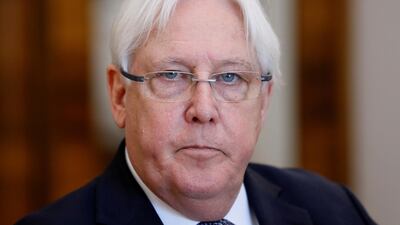The UN special envoy to Yemen, Martin Griffiths, met UAE officials on Tuesday in the hope of reviving the stumbling peace process.
Mr Griffiths began a tour of the region on Monday by meeting Russian Foreign Minister Sergey Lavrov and his deputy Sergei Vershinin in Moscow before heading to Abu Dhabi on Tuesday.
He brokered a deal in Stockholm last December between the internationally recognised government of Yemen and the Iran-backed Houthi rebels. But breaches by the rebels have halted the agreement.
Progress has been stagnant for weeks between the envoy and the government, especially after President Abdrabu Mansur Hadi accused Mr Griffiths of siding with the rebels, claiming he had “lost his ability to be a neutral arbitrator”.
“I met earlier today in Abu Dhabi with UAE Minister for Foreign Affairs, Dr Anwar Gargash, and Minister of State for International Co-operation, Reem Al Hashimi to discuss the advancement of the peace process in Yemen and steps needed to implement the Stockholm agreement,” Mr Griffiths said on Twitter.
“I am greatly encouraged by the UAE’s commitment and support."
A UN official told The National that Mr Griffiths would visit Oman after Abu Dhabi and that the trip had so far been successful.
Last week, he met Yemeni Vice President Ali Al Ahmar in Riyadh to try to regain the government’s trust.
Mr Griffiths reaffirmed the UN's commitment to working with both parties for a comprehensive, Yemeni-led peace agreement, and urged all parties to create an environment conducive to making it a reality.
Yemeni officials have also complained that Mr Griffiths has treated the Houthis as if they were a de facto government.
The conflict in Yemen began with the 2014 takeover of the capital Sanaa by Iran-backed Houthi rebels, who forced out the government.
Saudi Arabia is leading an Arab Coalition that includes the UAE and intervened in Yemen in 2015 to try to restore the government.


